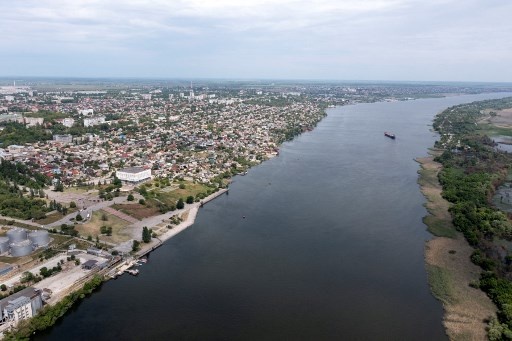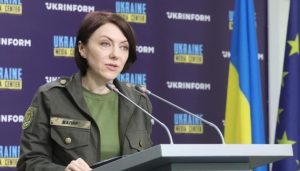
Eurotopics – How Significant is Russia’s Withdrawal from Kherson? – Kyiv Post
This file photo taken on May 20, 2022 shows an aerial view of the city of Kherson, amid the ongoing Russian military action in Ukraine. – Russian Defence Minister Sergei Shoigu on November 9, 2022 ordered Moscow’s troops to withdraw from the city of Kherson in southern Ukraine, which Ukrainian forces have been advancing on for weeks. (Photo by Andrey BORODULIN / AFP)
Photo by AFP
Russia’s troops are withdrawing from the port city of Kherson and other parts of the Kherson Oblast in southern Ukraine. Defence Minister Sergei Shoigu ordered the western bank of the Dnipro to be cleared on Wednesday, saying the region could no longer be adequately supplied. With this move, Russia loses the only regional capital it has captured since the start of the invasion. Commentators assess the situation.
Today, Europe’s press debates the ongoing Russian invasion of Ukraine. Here are some opinions from a selection of European publications, presented by eurotopics.
Another key moment in the war
The withdrawal is a severe defeat for Russia, Deník N points out:
“With a population of 300,000 before the war, the city of Kherson was the largest regional centre the Russians had occupied since the beginning of this year’s aggression in Ukraine – and now they are having to abandon it. … Above all, Kherson’s location is highly symbolic; the Russians are losing the only city on the right, western bank of the Dnipro. And this is the country’s most important waterway. … The liberation of Kherson is therefore another key moment in the war.”
Ceasefire no longer ruled out
Russia’s withdrawal could indicate a willingness to negotiate for the first time since the beginning of the invasion, La Repubblica hopes:
“It is a turning point. No one believes that the conditions for peace exist: Ukraine will not accept it until the occupied territories are fully liberated. Since yesterday, however, the conditions have been in place for the start of talks on a ceasefire that would put an end to the slaughter. … A ceasefire that would be protected by the wide waters of the Dnipro. But there are still many uncertainties. … [On Russia’s side] the military leadership took charge of all communications. … The reaction of the Zelensky government is driven by caution and mistrust.”
A clever move by Moscow
The significance of this step should not be overrated, cautions The Spectator:
“This is a military defeat, but not necessarily a decisive one. Much will depend on how far the Russians can manage an orderly retreat rather than a rout. One would expect that they have planned this through, withdrawn stocks of materiel and ammunition that they don’t want the Ukrainians to take, perhaps even decided to commit more of their generally risk-averse aircraft to covering the retreat. … If it works, then the Russians will have surrendered the only major city they had taken in this invasion, but now have a chance to consolidate along a more viable defensive line along the Dnipro.”
Better to continue withdrawal
In a Facebook post, economics professor Konstantin Sonin says this is a step in the right direction:
“Decisive for Russia now would be to continue withdrawing its troops from all of Ukraine. As soon as the troops have been withdrawn from the newly occupied territories, I believe Zelensky will agree to negotiations. It will be a simple matter to agree to extensive compensation payments, because the 300 billion dollars [in foreign exchange reserves abroad] that were blocked after the war began are lost to Russia anyway. The consequences of the war will reverberate for decades to come, but at least the reconstruction of the country and the economy could begin sooner. Later it will only be more difficult.”
Clear signs of disintegration
The defeats are fuelling internal strife in Russia, writes Club Z:
“This time the disintegration process due to the pressure of losses in Ukraine seems to be coming from the Russian Armed Forces. … Relations between Putin’s eight armies (the regular army under Surovikin, the Wagner private army, at least one other private army, Kadyrov’s Chechen thugs, the ‘armies’ of the Donetsk and Luhansk ‘people’s republics’, the Nazgvardia and Rosgvardia national guards) are becoming increasingly complex and hostile. … There have already been several clashes between the Buryats in the regular army and Kadyrov’s Chechens. There are also visible tensions within Surovikin’s forces – both between mercenaries and conscripts and along ethnic and religious lines.”
Sending in backup from Afghanistan won’t help
No matter how many soldiers Putin sends to fight in the Ukraine war it won’t be enough for him to win, observes Karar:
“He mobilised Kadyrov’s men, received support from Assad’s army, took prisoners out of jails and sent them to the front, but it achieved nothing. Even the partial mobilisation he announced brought no improvement. The solution? Afghan commandos on the run from the Taliban! It’s like a joke. … Will this army of incompetents, into whose training the US put billions of dollars but who couldn’t withstand the attacks of the Taliban for even three weeks and fled the front, now be a game-changer?”


Average Rating